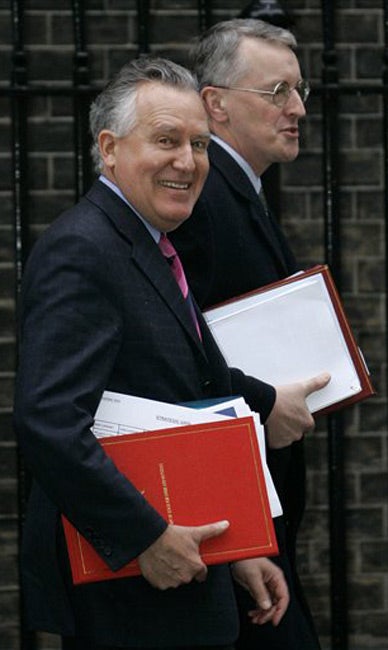Police may be asked to investigate Hain's undisclosed donations

Your support helps us to tell the story
From reproductive rights to climate change to Big Tech, The Independent is on the ground when the story is developing. Whether it's investigating the financials of Elon Musk's pro-Trump PAC or producing our latest documentary, 'The A Word', which shines a light on the American women fighting for reproductive rights, we know how important it is to parse out the facts from the messaging.
At such a critical moment in US history, we need reporters on the ground. Your donation allows us to keep sending journalists to speak to both sides of the story.
The Independent is trusted by Americans across the entire political spectrum. And unlike many other quality news outlets, we choose not to lock Americans out of our reporting and analysis with paywalls. We believe quality journalism should be available to everyone, paid for by those who can afford it.
Your support makes all the difference.The Electoral Commission is considering whether to refer the case of Peter Hain's undisclosed donations of £103,000 to the Metropolitan Police because of the sheer scale of the amounts involved.
Sources close to the investigation into Mr Hain's failed campaign for Labour's deputy leadership made it clear that the commission would have to decide whether to press for a criminal prosecution.
One well-placed source warned yesterday that the Work and Pensions Secretary's claim to have been too busy as a cabinet minister to keep track of his campaign contributions showed "contempt" for the law on registering donations.
The commission's investigation is thought to be at an early stage. If the watchdog finds Mr Hain guilty of a breach of the rules, it faces a difficult choice between rapping him on the knuckles or calling in the police.
Under the law, the commission can impose fines on political parties if they fail to register donations properly, but has no power to fine individual "regulated donees" such as Mr Hain. Its only formal sanction against individuals is to refer breaches of the Political Parties, Elections and Referendums Act 2000 to the police.
The seriousness with which the Hain affair is viewed by the commission is a blow to the minister's attempt to hang on to his job. If he were the subject of a police investigation, he would come under enormous pressure to resign.
Downing Street praised Mr Hain as a "great minister" yesterday, but the Prime Minister, Gordon Brown, made it clear that his fate would depend on the separate inquiries by the commission and John Lyon, the Parliamentary Standards Commissioner, who confirmed that he was launching a full investigation because Mr Hain had a case to answer.
Mr Hain promised to co-operate fully with the inquiries. He told journalists: "I've been open and clear about this from the beginning, when I discovered these donations had been made late."
There was little sign of support for Mr Hain among Labour MPs at Westminster. Ian Gibson, the MP for Norwich North, said: "If I was in his position, I think I would resign. I think I would feel ashamed I had let the side down."
Chris Grayling, the shadow Work and Pensions Secretary, called on Mr Hain to answer the outstanding questions over the affair, including the use of a previously unknown think-tank, the Progressive Policies Forum, to channel donations and loans worth £51,000 to Mr Hain.
He said: "My big anxiety is that there are now so many unanswered questions that this is going to prove an ongoing distraction for Mr Hain at a time when his department has so many significant issues to address."
Labour sought to keep the pressure on the Tories over funding by challenging them to disclose any other donations for shadow ministers paid through Conservative Party HQ. It emerged at the weekend that George Osborne, the shadow Chancellor, had received almost £500,000 to run his office from Tory donors, but had not disclosed the payments in the MPs' register of interests.
The Tory leader, David Cameron, said the names of individual donors to members of the shadow Cabinet would be published if that was required by Commons officials. He insisted his party had nothing to hide and said of Mr Hain: "He has a choice: he can get out there and explain himself, or I think he will have to leave the Cabinet."
In a seperate development last night, it emerged that one of Mr Hain's key financial backers, Willie Nagel, made donations during the 1990s to the constituency office of Sir John Major, a former prime minister, while promoting a proposed defence deal with the Tory government.
pandora, page 14
Read Andy McSmith on the role of the PPF, plus rolling comment on party funding at www.independent.co.uk/ openhouse
The unanswered questions
* What was Peter Hain's relationship with the Progressive Policies Forum (PPF), which gave £26,600 in donations and a £25,000 interest-free loan to his deputy leadership campaign?
* Did all the donors who gave money to the Hain campaign through the PPF give their permission for it to be used in this way before it was handed over?
* Why did they give money through the think- tank, rather than directly?
* Were some of those who gave money via PPF turned down as donors earlier in the Hain campaign because they wanted to remain anonymous?
* Did any potential conflict of interest arise over Mr Hain's role as a minister and his links with his campaign donors?
* What checks did Mr Hain make to ensure that donations were properly registered?
* Will the PPF open its books to the Electoral Commission?
* When did Mr Hain first become aware of the debts of more than £100,000?
* What has the PPF done since it was formed in December 2006?
* Was it a front organisation for the campaign?
Join our commenting forum
Join thought-provoking conversations, follow other Independent readers and see their replies
Comments